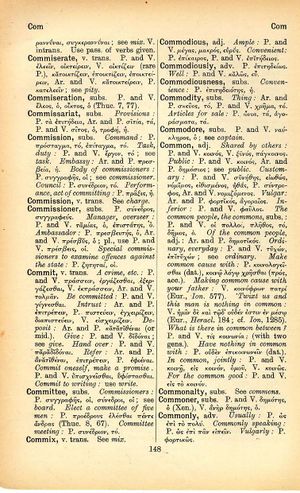common
Βίος βίου δεόμενος οὐκ ἔστιν βίος → Non est vitalis vita victus indigens → Kein Leben ist ein Leben ohne Unterhalt
English > Greek (Woodhouse)
adj.
Shared by others: P. and V. κοινός, V. ξυνός, πάγκοινος.
Public: P. and V. κοινός, Ar. and P. δημόσιος; see public.
Customary: P. and V. συνήθης, εἰωθώς, νόμιμος, εἰθισμένος, ἠθάς, P. σύντροφος, Ar. and V. νομιζόμενος.
Vulgar: Ar. and P. φορτικός, ἀγοραῖος.
Inferior: P. and V. φαῦλος.
The common people, the commons, subs.: P. and V. οἱ πολλοί, πλῆθος, τό, δῆμος, ὁ.
Of the common people, adj.: Ar. and P. δημοτικός.
Ordinary, everyday: P. and V. τυχών, ἐπίτυχών; see ordinary.
Make common causewith: P. κοινολογεῖσθαι (dat.), κοινῷ λόγῳ χρῆσθαι (πρός, acc.).
Making common causewith your father: V. κοινόφρων πατρί (Eur., Ion. 577).
'Twixt us and this man is nothing in common: V. ἡμῖν δὲ καὶ τῷδʼ οὐδέν ἐστιν ἐν μέσῳ (Eur., Heracl. 184; cf. Ion, 1285).
What is there in common between? P. and V. τίς κοινωνία; (with two gens.).
Have nothing in common with: P. οὐδὲν ἐπικοινωνεῖν (dat.).
In common, jointly: P. and V. κοινῇ, εἰς κοινόν, ὁμοῦ, V. κοινῶς.
For the common good: P. and V. εἰς τὸ κοινόν.

